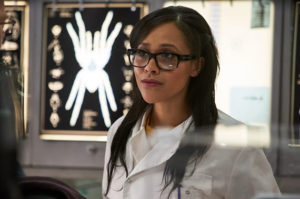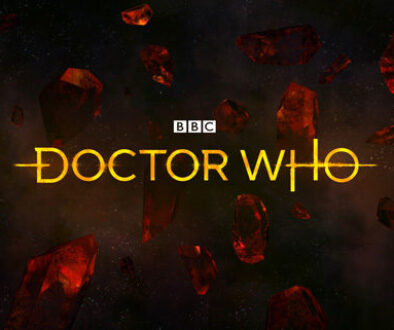2nd Opinion: “Arachnids in the UK”
Connor Johnston & Gustaff Behr give their takes on the fourth episode of Series 11.
Connor’s View – “Home Is Where The TARDIS”

Hidden within the climactic dialogue of this week’s adventure, the Doctor makes an observation that unravels the mystery behind Sheffield’s spider infestation. An early strength of Chibnall’s writing so far allows much of his dialogue to take on a broader significance in the greater context of his episodes, with this same observation acting as somewhat of a foundation for each of our characters’ continued personal journeys:
“In the end, every living thing has the same instinct; to come back home”
Throughout the episode, the idea of ‘home’ is something that transforms quite a bit. Initially, it is our return to Sheffield that prompts this first shift. Despite having finally made it back to their destination, there’s a hesitance from all four of our team to say goodbye for good. Since Grace’s death, Graham hasn’t had the regular opportunity for grief, and the house he shared with her isn’t a point of familiarity or warmth – but a constant and active reminder of her absence in his life. Ryan faces a similar sense of unease, left debating his ‘proper’ place following his father’s resurfacing and growing fondness and dependability on Graham. Despite making it back to Sheffield, it’s not emboldened with the sense of ‘home’ it once was.
Yaz faces quite a different conflict in returning to her normal life and family. There’s clearly no shortage of love or warmth in the Khan household, though unlike Graham and Ryan whose hesitance is brought on by an absence – it is the abundance of mundane familiarity that causes her dreams to wander. Though Yaz’s heart is with her family, the safety of her place there doesn’t endorse reassurance, but the fear of immobility.
To allow our characters the chance to come to terms with their new perspectives, we’re quickly gripped into the episode’s face-value narrative that sees Sheffield’s spider population lash out on a terrifying scale. “Arachnids in the UK” is an episode that spares little in the way of classic Doctor Who suspense, action and intrigue – echoing the commentary, quirk and emotional conflicts of some of the greatest standalone episodes of the show’s history.
 Guest stars Shobna Gulati and Tanya Fear contribute greatly to the episode’s dynamic. So too does Chris Noth, who’s portrayal of Jack Robertson grows from a Trump-esque parody of contemporary personalities to a corrupt and chilling embodiment of ideologies that counter almost everything the Doctor stands for. While his attitudes may come across as unsubtle initially, Robertson’s involvement in “Arachnids” paves the way for future reappearances that may just prove just how destructive the wrong ideologies can be in positions of power.
Guest stars Shobna Gulati and Tanya Fear contribute greatly to the episode’s dynamic. So too does Chris Noth, who’s portrayal of Jack Robertson grows from a Trump-esque parody of contemporary personalities to a corrupt and chilling embodiment of ideologies that counter almost everything the Doctor stands for. While his attitudes may come across as unsubtle initially, Robertson’s involvement in “Arachnids” paves the way for future reappearances that may just prove just how destructive the wrong ideologies can be in positions of power.
Despite a strong ensemble of characters, it’s Whittaker’s Doctor that is perhaps the best served by the episode’s script this week. This is the first real situation where we’ve seen her able to completely digest a mystery, inhibit an unquestioned role of authority and dictate every aspect of the narrative’s progression and resolution without too many external pressures. Without discrediting her three previous (and brilliant) performances; “Arachnids” provides our clearest experience of the Thirteenth Doctor to date.
Alongside Chibnall’s script, it is Sallie Aprahamian’s direction that impressively allows for all the elements of “Arachnids” to work together so well, in what is possibly the most striking example of a director’s introduction to the show since Rachel Talalay’s debut with Series 8’s ‘Dark Water’. From the establishing sequence through Robertson’s hotel that takes on the breaths and movements of our titular creatures, to the chaos and beauty of the TARDIS travelling through the time vortex – Aprahamian’s work parades a sense of adventure and scale unique to the visual identity of Doctor Who. She’s also mastered the art of pace, allowing the opportunities for slower moments of reflection among the anarchy and suspense without creating jarring tonal divisions.
The episode concludes by returning to the concept of ‘home’ we began with. The unease our three friends have felt returning to Sheffield, next to the wonder and courage they’ve experienced already with the Doctor culminate in perhaps the most informed and conscious choice to travel in the TARDIS we’ve ever seen. Chibnall’s choice in delaying the “official” beginning of Yaz, Graham and Ryan’s adventures until almost halfway into the series was undoubtedly a massive risk, though pays off in one of the most moving final scenes in recent history – enhanced incredibly by the investment we’ve built for these characters over the last few weeks. Though the TARDIS isn’t in Sheffield and is unable to guarantee safety and familiarity; for our team and for ourselves: there’s no stronger sense of ‘home’.
Gustaff’s View – “Strong aesthetics, little else”

A good way to foreshadow this episode would have been to linger on some cobwebs back in “The Woman Who Fell To Earth”, but since it didn’t I’m left wondering how nobody noticed an invasion of giant spiders in Sheffield. I mean one of them was comfortable in Graham’s apartment, for goodness sakes.
“Arachnids in the UK” makes use of one of the most common human fears and builds a story around that which allows the director to showcase some clever angles, mimicking how the world looks from a spider’s POV. It’s just one of this episode’s many visually cool aesthetics. The new time vortex is yet another marvel to behold. It may just be the most beautiful, topsy-turvy portrayal yet, but with such stunning detail that I actually wanted the episode to spend more time in there. The actual spiders are realistic, wonderfully rendered and utilized excellently throughout the episode.
Unfortunately aesthetics and cinematography is about as far as this episode succeeds. Once more it becomes apparent that outside of character pieces, Chris Chibnall struggles to write proper sci-fi. And again the so-called ‘villain’ for the episode is disappointing and dealt with in an anti-climatic, easy fix manner. If it had been the Doctor forced to mercy kill the giant spider, just imagine how poignant the scene would’ve been. Not to mention the call backs to “The Beast Below”.
 This episode tries very hard to give us a better look at Yaz, but she still feels like the most generic and unnecessary companion of the three. Unfortunately the narrative forgets about sub-plot and has the accidental effect of giving us more insight into her family. They feel more like caricatures than actual people, her father and her sister falling in line with just about every other companion family in the series so far (the Tylers, Jones, Nobles, Oswalds and Potts’). In fact, the only noteworthy thing Yaz does in this episode is pick her mum up from work.
This episode tries very hard to give us a better look at Yaz, but she still feels like the most generic and unnecessary companion of the three. Unfortunately the narrative forgets about sub-plot and has the accidental effect of giving us more insight into her family. They feel more like caricatures than actual people, her father and her sister falling in line with just about every other companion family in the series so far (the Tylers, Jones, Nobles, Oswalds and Potts’). In fact, the only noteworthy thing Yaz does in this episode is pick her mum up from work.
Graham and Grace’s scenes together, however short and silent, manages to sell the grief of a man lost without his best friend. It’s scenes like this that highlight the best of Doctor Who and it’s a shame more attention couldn’t be devoted to Graham and ghost-Grace. Bradley Walsh is shattering expectations by being the most fleshed out and most entertaining of the Doctor’s new companions this season.
I don’t mind when Doctor Who tackles politics. I do mind though when they don’t tackle it with subtlety. Chris Noth’s character is about as close to a walking, talking anti-Trump message as you’re going to get, featuring too many heavy-handed scenes that just robs the episode of valuable run time. Seriously, apart from the fact that he owns the building, is there any reason why this character needed to be in this episode? He’s not entertaining or funny. Or is it just because the episode needed an easy way out in the third act? After all, if someone we dislike does something bad then it’s easy to get mad, but that’s more entertaining than showcasing a genuinely good person making a terrible choice for a good reason? Isn’t it? No I didn’t think so either.
Jodie’s Whitaker’s dialogue in this episode also felt very ham-fisted this week, reminding me of “The Lodger”, but in a bad way. Not only this, but the Doctor comes across as overly judgemental and drawn to flaunting her immense superiority all over the place. A part of me really hates how the script let the Doctor off the hook by having Discount-Trump make the killing. It would’ve been super interesting to see what she would have done instead. Convenient oversized dying spider is convenient. The way Jodie holds the sonic screwdriver – not just taking it out and pointing it, but bringing it all the way over her head like she’s pitching in a baseball game – it’s very distracting and more in habit of a cos-player pretending to be the Doctor than the actual Doctor.
We are now four episodes in and Series 11 has yet to come out with a non-divisive, super entertaining story which features the perfect balance of sci-fi, villain and character drama. I can’t help but wonder why the fandom has to wait this long for this quality. I have a feeling this season’s breakout episode will now not be written by Chibnall. And when you look at things through that perspective, shouldn’t we expect more? Why do we have to wait so long in this era of Doctor Who just for one or two diamonds in the rough?








